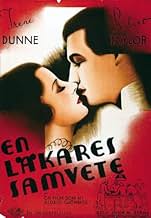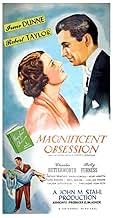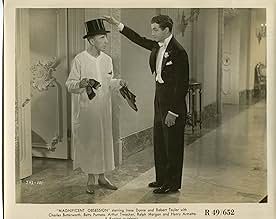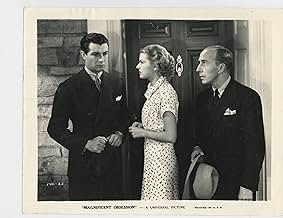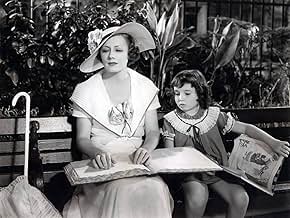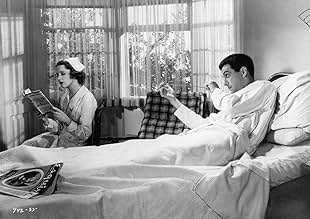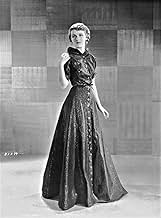Adicionar um enredo no seu idiomaThe life of spoiled rich Robert Merrick is saved through the use of a hospital's sole resuscitator, but because the medical device cannot be in two places at once, it results in the death of... Ler tudoThe life of spoiled rich Robert Merrick is saved through the use of a hospital's sole resuscitator, but because the medical device cannot be in two places at once, it results in the death of Dr. Hudson, a selfless, brilliant surgeon and generous philanthropist. Merrick falls for ... Ler tudoThe life of spoiled rich Robert Merrick is saved through the use of a hospital's sole resuscitator, but because the medical device cannot be in two places at once, it results in the death of Dr. Hudson, a selfless, brilliant surgeon and generous philanthropist. Merrick falls for Hudson's widow Helen, although she holds him responsible for her husband's demise. One day... Ler tudo
- Direção
- Roteiristas
- Artistas
- Prêmios
- 3 vitórias no total
- Amy
- (não creditado)
- Chief Inspector
- (não creditado)
- Man on Pier
- (não creditado)
Avaliações em destaque
It was a best seller in 1929 for newly minted writer Lloyd C. Douglas, a former Methodist minister who had retired from the pulpit and spent the rest of his life writing fictional works with a religious theme.
Irene Dunne was by this time a very big star and Magnificent Obsession entered the pantheon of her big hit films. But for Robert Taylor it was the breakout film of his career, establishing him once and for all as a star player with potent box office.
Taylor was a special favorite of Louis B. Mayer at MGM, it wasn't an accident he established a record for the longest studio contract in film history. Taylor was coming along in his career quite nicely as and had gotten notice in some supporting roles and had even had a lead in Murder in the Fleet. He had also played part of a love triangle as another doctor in Society Doctor with Chester Morris and Virginia Bruce.
I'm betting that it was that this was the film that Carl Laemmle saw at Universal when he asked Mayer for Taylor's service on a loan out. This would have been a win-win situation for MGM. If Taylor clicked they had his services and if he didn't it was Universal's loss.
Anyway it was in this role as the shallow playboy who becomes a noted surgeon that Taylor scored his big hit. His growth in some ways is similar to Tyrone Power's later on in The Razor's Edge. In fact had this been done at 20th Century Fox Power would also have had a big hit. But his breakthrough year was one year away.
Through a combination of unfortunate circumstances a noted doctor, esteemed for his good works dies suddenly of a heart attack. He might have been saved, but a resuscitator was being used on a young Taylor who was involved in a speeding boat accident. He becomes a hated figure with the family and friends of the late doctor, especially his new widow, Irene Dunne.
Later on Taylor while in an inebriated state meets up with Ralph Morgan who lets him spend the night and sober up on his couch. When Taylor awakens, Morgan talks to him about trying to tap into a higher power by doing some good works and it will redound to his favor on earth and in heaven. And the idea is to shun publicity for the same.
Taylor expects some more immediate return on good works, but it he gradually comes to a full realization of what Morgan is talking about. Former minister Lloyd C. Douglas had used as the basis for this philosophy, Matthew Chapter 6, 1-4. The substance of which don't flaunt your good works before humanity openly because then you'll be courting favor with the world. But if you do it with as little fanfare as possible, God will reward you in heaven and on earth.
Robert Taylor was 24 when he made this film and the part called for him to age several years and he succeeds as both the playboy and the mature and spiritual doctor. Magnificent Obsession was remade 19 years later with Rock Hudson and Jane Wyman and proved to be as big a hit with audiences then as in the Thirties.
Robert Taylor made very few films away from MGM until his contract was up after 1958. I suppose his services were Louis B. Mayer's Magnificent Obsession.
Robert Merrick (Taylor) is a drunken playboy who, one afternoon, falls off his sailboat and has to be resuscitated with the use of what's called in this film a "pulmotor," a device that forces oxygen into the lungs.
Unfortunately, the pulmotor was needed across the lake for an older man, a Dr. Hudson, who has had a heart attack, but because one isn't available, the man dies. When his wife (Dunne) and daughter (Betty Furness) arrive home, they get the horrible news. There is bitterness everywhere because Dr. Hudson was beloved, a fine doctor and an exceptional man, and Merrick is a drunken, rich loser.
At one point, Merrick meets a man (Ralph Morgan) who gives him the secret philosophy that Dr. Hudson lived by and taught him - give anonymously and without expecting repayment.
When Merrick spots Mrs. Hudson, he has no idea who she is and tries to pick her up. One day, he offers her a ride and "runs out of gas." As she's leaving the car to take a ride with someone else, a car hits her and she is badly injured - in fact, she's blinded.
Merrick now befriends her in the park, where she sits practicing her Braille. He doesn't identify himself - she calls him "Dr. Robert"; he tells her that he once had aspirations to be a doctor himself. He arranges for her to have a steady income, since Dr. Hudson gave most of his money away and only has worthless stocks - she thinks her husband's copper stocks are now worth a lot -- and then he arranges for some of the finest doctors in the world to meet in Paris and study her. She thinks it's because her husband was so highly regarded. Alas, the prognosis is that the doctors see no point in surgery. It goes on from there, assuming fabulous aspects.
This kind of melodrama was extremely popular in the 1930s; director Douglas Sirk loved this type of film and remade some of them in the '50s, giving them big, glitzy productions, and made some new ones as well.
Though today the plot seems ridiculous, because of the commitment and likability of the actors and the spiritual undertone that goes throughout the film, somehow one doesn't stop watching, and it sure worked well in 1935 and 1954.
Robert Taylor is gloriously handsome, known for his perfect profile, resonant speaking voice, and charming presence. I have never considered him much of an actor, but he was my mother's favorite, and I watch him every time he's on TCM in her honor. He holds the record for being employed by a studio the longest - 24 years with MGM, until it dissolved, and went on to more films, a successful television show, and he replaced Ronald Reagan on Death Valley Days.
Irene Dunne gives a lovely performance without histrionics or being overdone in any way.
Good movie? For what it is, yes.
I know that the later version with Rock Hudson and Jane Wyman is considered to be a good remake by film critics and fans, however, when I tried to watch it, I revolted at the glitzy technicolor melodrama. The magic, the old Hollywood glamour, the passion and the agony I found in watching the original seemed completely lost in the remake. I hope they do restore this movie before it is lost forever. I hope I get to see this movie again some day.
Randolph's character seems more important in Stahl's version.His theory is certainly moving:You've only got what you give and you should not expect any award.Merrick tries to apply this theory,first because he wants to seduce the wife of the philanthropist/doctor who indirectly died because of him,because he was an alcoholic playboy.He has not really understood what Randolph tried to explain to him.The scene with the hobo comes as a comic relief,which is terribly needed in such a dark yarn.When ,as leaving the poor man,Merrick thinks he's got some divine reward,he's completely mistaken.A Christian movie,"magnificent obsession" sure is,as Randolph,in his second scene ,mentions the Christ. After all,his theory is not that much far from that of James Stewart's guardian angel in "it's a wonderful life".
Unlikelihoods are here there and everywhere,but it's the rules of melodrama.The story ,which includes death,blindness,moral and physical redemption,is not more far-fetched than westerns and thrillers plots.And life is so strange that it can turn sometimes into the most implausible melodrama;and like it or not,not necessarily with a happy end.
Você sabia?
- CuriosidadesThis film is featured as a bonus on "Magnificent Obsession" (1954), released by the Criterion Collection, spine #457.
- Erros de gravaçãoWhen operating on Helen's eyes, Merrick asks for an otoscope. He should have asked for an opthalmoscope. An otoscope is for ears.
- Citações
Robert Merrick: Take back to the cook and tell her that if she brings back again, I'm gonna buy this hospital and fire her and everybody else in it. I want some decent breakfast.
Nurse: It's the same breakfast we serve all the patients.
Robert Merrick: Yeah, but I am "The Special".
- Versões alternativasAll prints now in circulation run 102 minutes.
- ConexõesFeatured in The Universal Story (1996)
- Trilhas sonorasRomeo and Juliet Fantasy-Overture
(uncredited)
Written by Pyotr Ilyich Tchaikovsky
Played under the opening credits
Principais escolhas
- How long is Magnificent Obsession?Fornecido pela Alexa
Detalhes
- Data de lançamento
- País de origem
- Idiomas
- Também conhecido como
- Magnificent Obsession
- Locações de filme
- Empresa de produção
- Consulte mais créditos da empresa na IMDbPro
- Tempo de duração1 hora 52 minutos
- Cor
- Proporção
- 1.37 : 1

